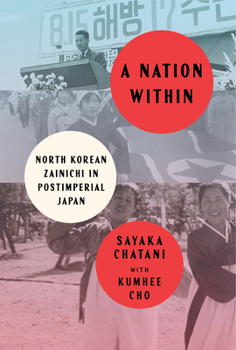A Nation Within: North Korean Zainichi in Postimperial Japan
The presence of hundreds of thousands ethnic Koreans in Japan, or "zainichi Koreans," is one of the visible legacies of Japanese colonialism. A surprising and influential group among zainichi Koreans that persists to this day is Chongryon, the only pro-North Korean diasporic group based in a capitalist society. Chongryon historically represented the central grassroots force seeking to liberate Koreans from Japan's imperial and neo-imperial influences. At the heart of the Chongryon community stands a political organization equipped with a central bureaucracy in Tokyo, with a headquarters in nearly every prefecture. Often called a de facto embassy of North Korea, the Chongryon organization has, in effect, functioned as a state within another state--operating hundreds of schools, banks, hospitals, business associations, publishing houses, and many other institutions across Japan.
Based on extensive archival research and nearly 250 original interviews collected with co-researcher KumHee Cho, who was raised within the Chongryon community, Sayaka Chatani offers a sweeping social history of this secretive, protective community in xenophobic Japanese society. Weaving together personal accounts and situating them in a multi-layered, transnational political context, the book offers a finely textured, intimate narrative of the community's tumultuous history and decolonial praxis. Through the stories of Chongryon, this book provides a bottom-up analysis of power politics among zainichi Koreans and reshapes our understanding of Japanese history, Korean history, and the Cold War in Asia.
Related Subjects
History




